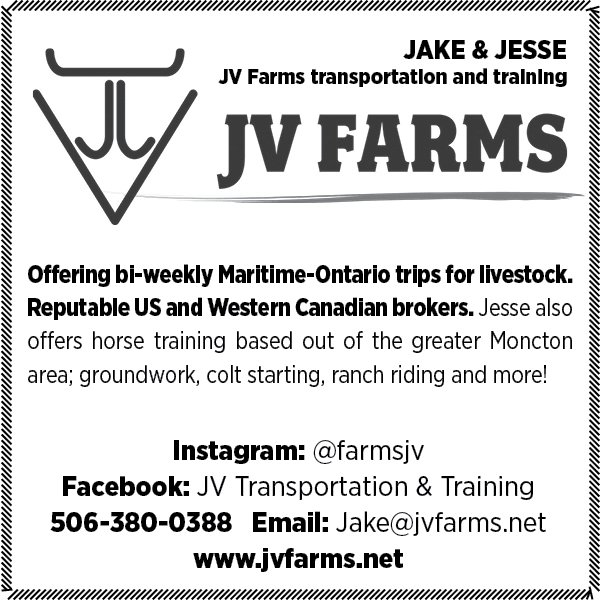Head Office Atlantic Beef Spring 2019
/NB Cattle Producers
Top forage management tips
by Allison Finnamore
Quebec-based forages and dairy production expert Robert Berthiaume participated in the New Brunswick Cattle Producers’ fall regional meetings. He says there are a few key messages producers in the region need to be mindful of with forages and grassland for livestock feeding:
1. Treat your hayfields and soil like cows. Just as a cow needs replenished reserves and adjusted nutritional needs throughout her life cycle, so too do soil and hayfields.
“We have to stop treating soil like it is only dirt,” Berthiaume says.
To begin, he says, weigh some bales and determine moisture levels/dry matter yields. “If you don’t measure how much milk your cow produces, how do you know your best cow? How do you start improving?” Turning back to the analogy of treating hayfields like a cow, Berthiaume says “Quantifying is a basic and yield drives cost. We know if we have good yield, we will reduce the cost of forage.”
Knowing yields, he adds, is an important first step to more critical information – determining the cost of forage production.
2. Plan to double dry matter yields. Aim for dry matter yield levels close to that of corn silage, at around 10 tonnes of dry matter per hectare. He says Statistics Canada currently reports dry matter yield at around five tonnes per hectare.
“It would be a major improvement to double that. We should look at this as a five-year project.”
3. It’s not about more fertilizer. Berthiaume says the best, most cost-effective and efficient ways to increase forage yields go back to taking care of the soil.
“You should put your money and time into improving drainage, improving the pH, and increasing organic matter in the soil. It’s about feeding the soil so, in the long-term, they stay healthy and improve in terms of structure.”
4. Manage the forages. Determine the best forages to plant by accessing local data. Berthiaume notes the excellent data on forages in Atlantic Canada is based on research led by Dr. Yousef Papadopoulos at Agriculture and Agri-Food Canada’s Experimental Farm in Nappan, Nova Scotia, where some of the research programs examine long-term trends in forage yields, nutritional value, animal performance, and species composition of complex grass-legume blends.
“Consider three or four species of grass with legumes to improve your forage production and reliability,” he says.
5. Determine your feed inventory. Berthiaume says that since most producers don’t know their dry matter yield, they also tend not to know their feed inventory on crops other than corn and soybeans. Increasingly, common extreme weather conditions like drought or severe cold means producers need to adjust feed needs accordingly.
“If you know how much you have, you should know how much you should buy if you’re struck with a drought, for example. You can be proactive instead of reactive,” he says. “It’s also important to target the right forage quality to the right animal at the right time.” Berthiaume points out that a cow close to giving birth has different dietary needs than a lactating cow.
Developing these points creates a plan of action to help with successful forage and grassland production on farms not only in New Brunswick, he says, but throughout the Maritimes.
(Allison Finnamore, based in Moncton, N.B., is the editor of FCC Express, a publication of Farm Credit Canada. She is also a partner in Cultivating Communications, an agricultural communications company, and she is an executive member of local, national, and international farm journalist organizations.)
Sheep Producers Association of Nova Scotia
Big turnout for “Improving Lamb Survival” workshops
by Fred Hamilton
Shubenacadie Sam predicted a late spring and so far it looks like he may be correct – let’s hope the cold weather doesn’t last much longer. By this point most of us are well into lambing season and those who aren’t will be starting in the coming weeks. Earlier this year, the Sheep Producers of Nova Scotia held “Improving Lamb Survival” workshops in both Lunenburg and Antigonish. Perennia ruminant specialist Jonathan Wort discussed tips and guidelines to help improve lamb survival rates including treating those suffering from hypothermia. Other topics included colostrum quality, warming boxes, stomach tubing, intraperitoneal injections, and benchmarking your lambing. We would like to thank everyone who came out and participated in the workshops, we had a big turnout for both nights. If you have any suggestions for future workshop ideas, please contact us at 902-897-6742.
There have been some changes to our board and we say “thank you” to our retiring board member Jerry Graham. He has dedicated his time to the Sheep Producers of Nova Scotia during the last few years. We wish a warm welcome to newly-elected Marie Ouimet and re-elected Andrew Hebda to the board for their three-year terms.
We would like to let producers know that the oral drench, Startect, has received Canadian approval to be used as a treatment and control for adult and immature worms including Haemonchus contortus and nematode parasites such as Teladorsagia and Trichostyonglyus. Producers can ask their veterinarians about the product and how to order it.
The Nova Scotia Flock Health Program is designed to encourage purebred and commercial sheep owners to utilize the professional services of a veterinarian on a regular basis. This will support the maintenance and improvement of flock health through application of the principles of preventative medicine. SPANS will be holding workshops related to flock health this fall and winter. For more information, please call 902-893-4642.
(Fred Hamilton is the president of SPANS. For any questions, comments or concerns, please contact the SPANS office at 902-893-7455.)
NS Cattle Producers
Bull Bonus Program will be available in 2019
by Larry Weatherby
Recently, Shubenacadie Sam told us that we are in for a late spring, and judging by the recent weather, he may just be right. For most of Nova Scotia, the winter has been colder than usual and we have had very little snow. We have been busy preparing for winter and spring workshops, meetings, and events, and it looks like it will be a jam-packed spring.
I want to start off by thanking everyone who attended the zone meetings during the early part of January; we had the best turnout in several years. I also want to thank Dr. Claire Windeyer, who joined us on our cross-province tour and spoke at each of the meetings on early calf health related to pain management. If you were unable to make the meetings, please let us know and we can provide a copy of her presentation.
In NSCP elections this year, Derek Gladney was elected in Zone 2 and Dean Manning was re-elected in Zone 5. The annual meeting was held on March 2 at the Best Western Glengarry in Truro. At the AGM, membership re-elected Victor Oulton as its director-at-large. The NSCP board re-elected Larry Weatherby as chair and National Check-Off Agency rep, Oulton as vice-chair and Canadian Cattlemen’s Association rep, and Dean Manning as secretary-treasurer.
At the zone meetings, we announced that the Bull Bonus Program will be brought back this year. The program is being fully funded by the N.S. Cattle Producers. Program details were announced at the annual meeting on March 2.
By the time you read this, it will almost be time for the Maritime Beef Conference. There’s still a couple of days to get registered and attend what will be the biggest event of the spring. The conference will have a great lineup of presentations and speakers, featuring Dr. John Kastelic.
Another mark of spring is the arrival of bull sale season. We encourage anyone looking to improve their genetics to attend the Balamore Farms Thickness Sells Bull and Heifer Sale on March 23, starting at 2 p.m. at the Atlantic Stockyards, as well as the Beef Test Station Breeding Stock Sale on April 6, starting at 1 p.m. at the Test Station in Nappan. Check our website for more information on both of these sales as they approach.
Make sure you check our newsletter later this month for upcoming spring workshops as well as more information on the 2019 Canada Beef Industry Conference to be held in Calgary.
As always, if you have any questions or comments or suggestions for workshops, don’t hesitate to contact the office. We have recently joined Facebook and Twitter to make connecting with producers much easier.
(Larry Weatherby is the chair of NSCP. For any questions, comments or concerns, please contact the NSCP office at 902-893-7455 or email office@nscattle.ca.)
PEI Cattle Producers
The board is responsible to its members
by Rinnie Bradley
As I write this article, the harsh winter winds are howling outside and I am reminded of a comment a friend once said about this time of year: “Look on the bright side, we are on the downside of winter.”
Before long most of you will be getting ready to plant crops and repair fencing in preparation to turn your cattle out to pasture. But there is still a lot to do before we get to the warmer months ahead.
One of the requirements of our organization is to hold spring and fall district meetings. This requirement was not just a formality, it was placed there to hold the board accountable to its members. District meetings are often held throughout the province to allow members to attend without travelling to Charlottetown. But the most important aspect is to make directors available to its members. As officers of an organization, we look forward to the opportunity to meet with our members, to get feedback on the programs and services we are currently offering, and to get ideas for new programs for the future. It is also important for us to hear about the concerns you have with regulations or other issues that impact your operation. Please take this opportunity to meet with your directors when they come to your neck of the woods. Spring district meetings are scheduled for March. Please stay tuned for details.
The annual general meeting of the PEICP will be held on April 2 (storm date April 4) at the Farm Centre in Charlottetown. The AGM gives a big picture overview of your industry, and the programs and services offered through the PEICP. The meeting, which begins at 7 p.m., includes a guest presentation and ends with beef on a bun. Please mark your calendar and plan to attend.
The closing date for the Beef Genetics program as well as the On-Farm Assurance program are rapidly approaching. All supporting documentation should have been submitted by now. If you still haven’t received payment, chances are there is an outstanding item that we are waiting for. Please give us a call if you haven’t received payment or if you have any questions.
We have completed a recent round of levy audits. This has raised some concern among producers. We really, really encourage you to call us and we would be happy to walk you through the process and answer any questions you may have. We understand that it sounds complicated, but it really isn’t. If you prefer not to call, then please check out www.peicattleproducer.com and the “Levies” tab where you will find a document called “Frequently Asked Questions Regarding Levies.” This will help you better understand the process.
We hope you have registered to attend the Maritime Beef Conference that will take place in Moncton on March 15 and 16. There is a great lineup of presenters and we are certain you will gather some nuggets of information to take home. Please check out the www.maritimebeef.ca for more information.
(Rinnie Bradley is the executive director of the P.E.I. Cattle Producers. She can be reached at 902-368-2229 or by email at cattlemen@eastlink.ca.)





















